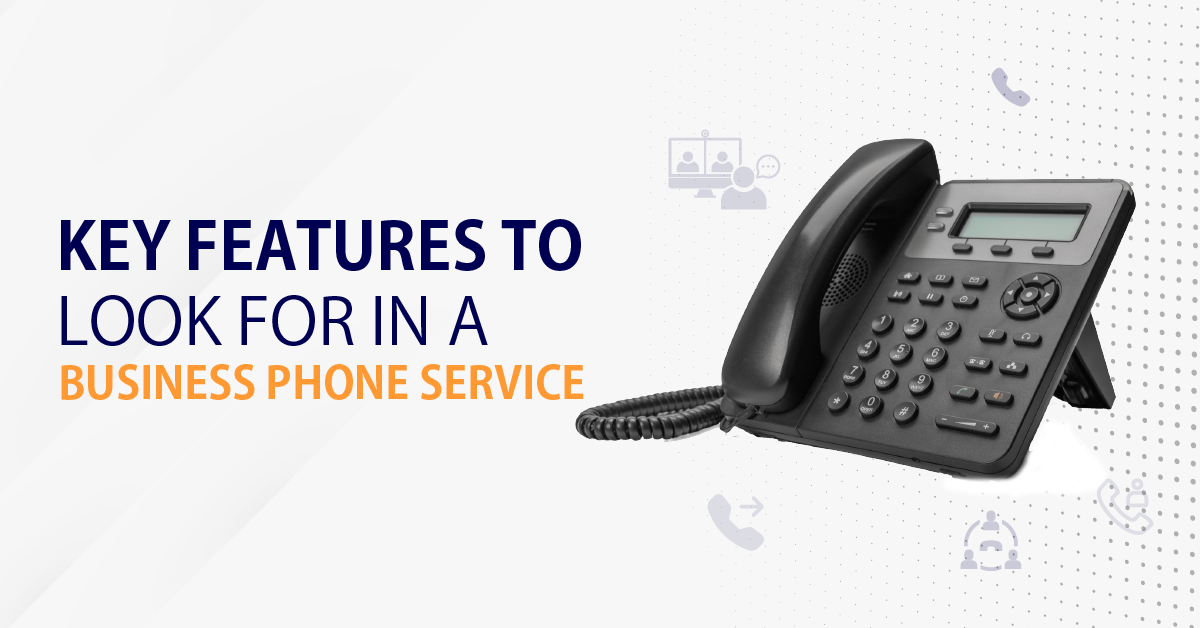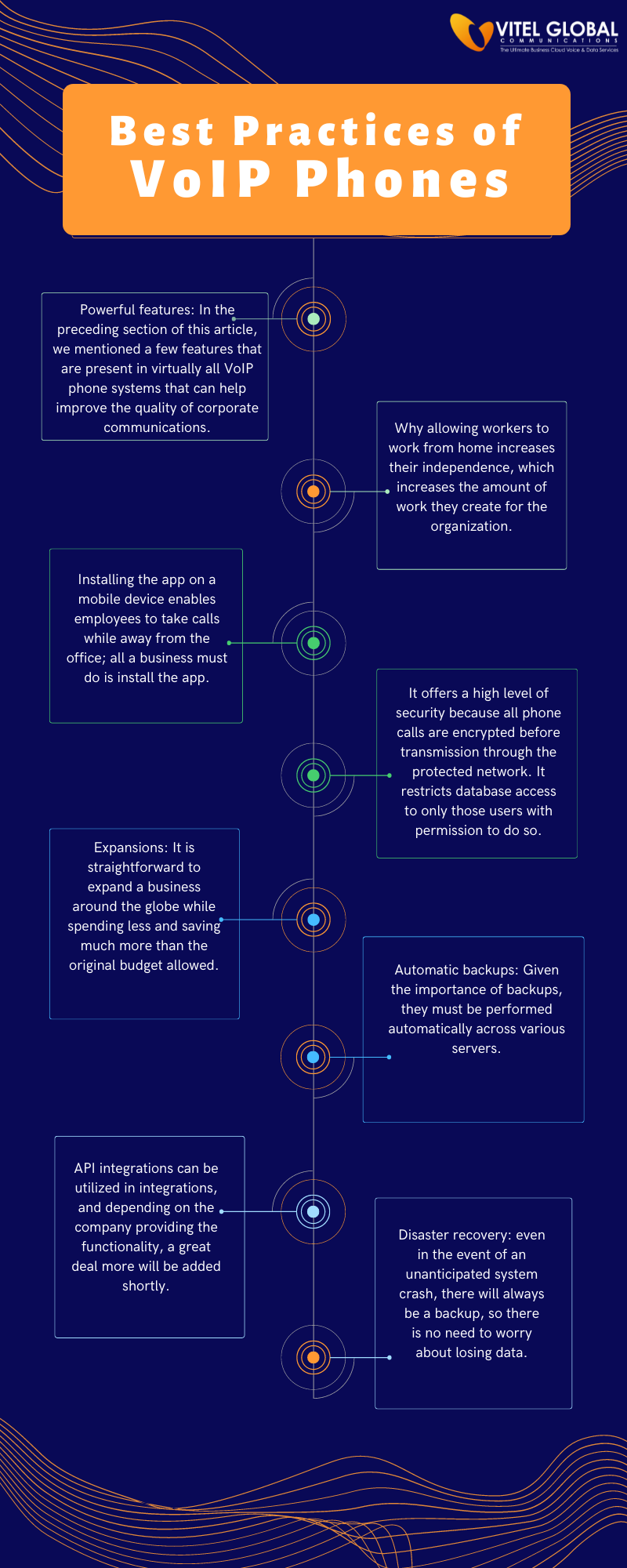Maximizing VoIP Phone Services: Key Features and Best Practices

4 min read
Voice over Internet Protocol (VoIP) phone service providers have revolutionized the way businesses communicate. Unlike traditional phone systems, VoIP utilizes the internet to transmit voice data, offering a plethora of Business Phone features and benefits. Here let us see the key features and explore the best practices.
Introduction
VoIP phone services enable users to make calls over the internet rather than through traditional telephone lines. Converting analog voice signals into digital data packets, which are then transmitted over the internet with the use of this technology. By leveraging existing internet infrastructure, VoIP offers significant cost savings and enhanced functionality compared to traditional phone systems.
Key VoIP Features
Advanced Communication
Unlike traditional phone systems that incur hefty monthly bills. VoIP services typically have lower subscription fees and offer competitive calling rates, especially for international calls. Additionally, many VoIP providers offer bundled services, including VoIP unlimited calling plans, further reducing communication costs for businesses.
VoIP systems offer advanced voice call features like auto-attendant and call transferring, enabling SMEs to project a larger company image at an affordable price. Conference calling features such as multi-party calling come included, eliminating the need for separate conference call services, thus reducing costs.
Scalability and Flexibility
Whether you’re a small startup or a large enterprise, VoIP allows you to easily add or remove phone lines as your business grows or requirements change. It offers flexibility in terms of device compatibility, allowing users to make and receive calls. It is possible from desktop computers, laptops, smartphones, or dedicated VoIP phones.
Advanced Call Management
VoIP systems provide advanced call management features such as call forwarding, voicemail-to-email transcription, and personalized call routing based on time of day or caller ID. These features enhance efficiency by ensuring that calls are handled promptly and routed to the appropriate person or department.
Integration with Other Business Tools
Another key feature of VoIP phone services is their seamless integration with other business tools and applications. VoIP systems can integrate with CRM integration software, email platforms, and collaboration tools. It allows for improved workflow automation and communication efficiency. By centralizing communication channels, businesses can enhance collaboration among teams and provide better customer service.
Enhanced Security Measures
VoIP systems utilize modern IP technology advancements such as end-to-end encryption and identity management to mitigate security threats. Providers continuously update and secure their networks through regular audits and automated alerts, ensuring a safe business environment.
Cost Savings
VoIP systems are generally less expensive than traditional phone services since voice signals travel over the internet, reducing carriage fees. Flexible payment plans, including pay-as-you-go options, enable businesses to pay only for the services they use, further reducing costs.
Improved Accessibility
Cloud-based VoIP services enable users to make calls from anywhere with a stable data connection. This anytime accessibility fosters flexibility and productivity, particularly in remote working environments, transcending geographical barriers and time zones.
Increased Portability and Scalability
VoIP systems offer high portability, allowing users to self-install and use the service on multiple devices. Additionally, scalability is seamless as there’s no need for expensive hardware or dedicated phone lines, enabling quick adjustments to organizational requirements without additional costs.
Superior Voice Quality
Advancements in high-speed internet and broadband connections ensure crisp and clear voice calls over VoIP networks. Features like noise-canceling microphones and advanced audio compression contribute to consistently high voice quality, enhancing communication experiences.
Global Reach
VoIP systems enable businesses to establish a local presence in multiple geographic locations. It is possible by providing virtual phone numbers with area codes from different regions. This global reach helps businesses expand their customer base and enter new markets without the need for physical offices.
Disaster Recovery
VoIP systems offer robust disaster recovery capabilities, allowing businesses to quickly recover from unforeseen events such as natural disasters or network outages. Cloud-based VoIP solutions store data redundantly in multiple locations, ensuring continuity of communication even in challenging circumstances.
Analytics and Reporting
Our best VoIP Services are providing analytics and reporting add-on which helps in giving access to valuable insights into call patterns, call volumes, and customer interactions. This data-driven approach allows businesses to make informed decisions, optimize resource allocation, and improve customer service.
Remote Management and Support
VoIP systems can be easily managed and supported remotely, reducing the need for on-site maintenance and support personnel. Remote management tools enable IT administrators to troubleshoot issues, perform updates, and monitor system performance from anywhere with an internet connection.
Environmental Sustainability
VoIP systems contribute to environmental sustainability by reducing carbon emissions associated with traditional phone systems. By eliminating the need for physical infrastructure such as copper wires and hardware components, VoIP helps businesses minimize their ecological footprint and adopt greener practices.
Unified Communication
VoIP systems often offer unified communication solutions, combining various communication channels like voice calls, cloud video conferencing solutions, instant messaging, and file sharing into a single platform. This unified approach simplifies communication management and improves collaboration among team members.
Best Practices for Maximizing VoIP Phone Services
Invest in Quality Hardware
To maximize the performance of VoIP phone services, it’s essential to invest in quality hardware, including routers, switches, and VoIP phones. Quality hardware ensures reliable voice transmission and minimizes latency issues, resulting in crystal-clear call quality and uninterrupted communication.
Ensure Reliable Internet Connection
Since VoIP relies on the internet for voice transmission, a stable and high-speed internet connection is crucial for optimal performance. Businesses should invest in reliable internet service providers (ISPs) and consider implementing redundancy measures, such as backup internet connections or failover systems, to mitigate downtime caused by network outages.
Implement Security Measures
Security is paramount when it comes to VoIP phone services, as they are susceptible to various cyber threats, including eavesdropping, identity theft, and unauthorized access. Businesses should implement robust security measures, such as encryption, firewalls, and intrusion detection systems, to protect sensitive voice data and prevent unauthorized access to the VoIP network.
Regularly Update Software
To safeguard against security vulnerabilities and ensure compatibility with the latest features and technologies, businesses should regularly update their VoIP software. Manufacturers release updates and patches periodically to address security flaws, improve performance, and add new functionalities. By staying up-to-date with software updates, businesses can enhance the reliability and security of their VoIP phone systems.
Provide Adequate Training for Employees
Lastly, it’s crucial to provide adequate training for employees on how to use VoIP phone services effectively. From basic call handling to advanced features like call forwarding and conferencing, employees should be familiar with the functionalities. Training sessions can help employees navigate the VoIP interface confidently, troubleshoot common issues, and leverage advanced features to enhance productivity.
Conclusion
Maximizing VoIP phone services involves key features, while sticking to best practices, providing adequate training for employees. By adopting these strategies, businesses can harness the full potential of VoIP technology to streamline communication, improve collaboration, and drive growth.
Published: September 30th, 2019
Subscribe to Our Latest Updates
Get monthly product and feature updates, the latest industry news, and more!








